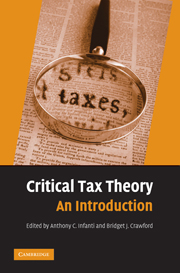Book contents
- Frontmatter
- Contents
- List of Illustrations
- List of Tables
- List of Contributors
- List of Common Abbreviations
- Introduction
- CHAPTER 1 FOUNDATIONS OF CRITICAL TAX THEORY
- CHAPTER 2 HISTORICAL PERSPECTIVES ON TAXATION
- CHAPTER 3 THE GOALS OF TAX POLICY
- CHAPTER 4 CRITICAL TAX THEORY MEETS PRACTICE
- CHAPTER 5 RACE AND TAXATION
- Tax Counts: Bringing Money-Law to LatCrit
- A Black Critique of the Internal Revenue Code
- The Marriage Bonus/Penalty in Black and White
- Tax and Race: The Impact on Asian Americans
- Race and Equality Across the Law School Curriculum: The Law of Tax Exemption
- Race and Class Matters in Tax Policy
- CHAPTER 6 GENDER AND TAXATION
- CHAPTER 7 SEXUAL ORIENTATION AND TAXATION
- CHAPTER 8 THE FAMILY AND TAXATION
- CHAPTER 9 CLASS AND TAXATION
- CHAPTER 10 DISABILITY AND TAXATION
- CHAPTER 11 GLOBAL CRITICAL PERSPECTIVES ON TAXATION
- CHAPTER 12 CRITICAL PERSPECTIVES ON CRITICAL TAX THEORY
- Index
Tax Counts: Bringing Money-Law to LatCrit
Published online by Cambridge University Press: 04 August 2010
- Frontmatter
- Contents
- List of Illustrations
- List of Tables
- List of Contributors
- List of Common Abbreviations
- Introduction
- CHAPTER 1 FOUNDATIONS OF CRITICAL TAX THEORY
- CHAPTER 2 HISTORICAL PERSPECTIVES ON TAXATION
- CHAPTER 3 THE GOALS OF TAX POLICY
- CHAPTER 4 CRITICAL TAX THEORY MEETS PRACTICE
- CHAPTER 5 RACE AND TAXATION
- Tax Counts: Bringing Money-Law to LatCrit
- A Black Critique of the Internal Revenue Code
- The Marriage Bonus/Penalty in Black and White
- Tax and Race: The Impact on Asian Americans
- Race and Equality Across the Law School Curriculum: The Law of Tax Exemption
- Race and Class Matters in Tax Policy
- CHAPTER 6 GENDER AND TAXATION
- CHAPTER 7 SEXUAL ORIENTATION AND TAXATION
- CHAPTER 8 THE FAMILY AND TAXATION
- CHAPTER 9 CLASS AND TAXATION
- CHAPTER 10 DISABILITY AND TAXATION
- CHAPTER 11 GLOBAL CRITICAL PERSPECTIVES ON TAXATION
- CHAPTER 12 CRITICAL PERSPECTIVES ON CRITICAL TAX THEORY
- Index
Summary
Tax and business law have generally remained outside the LatCrit enterprise, and that is too bad. The problem may be that tax and business law seem to be ultimately about money, and worrying about money appears so crass – so alien to the issues of antisubordination and social justice that have occupied center stage in LatCrit discourse. Those of us who labor in areas of the law concerned with the distribution, protection, and multiplication of money might therefore seem unlikely contributors to the LatCrit enterprise.
Although money-law is often seen as involving what Fidel Castro dubbed preocupaciones burgesas, of import only to those who have money and thus have reason to care about its protection and multiplication, such a view is shortsighted. A study of the ways in which the law entrenches the distribution of money and enhances its multiplication should be within the purview of all scholars who care about antisubordination, because the law can entrench and abet the absence of money and thus contribute to continued subordination. As I will demonstrate, tax systems can do precisely that.
MONEY, THE SECOND GENERATION
My claim is that the concern about money and economic well-being is not just a preocupación burgesa but is, at bottom, a concern about human rights. Social, economic, and cultural rights may be referred to as second-generation human rights, but the important thing is that they are acknowledged to be human rights.
A study of how the design of a tax system affects economic well-being is central to this analysis, particularly in the United States, where so much of our social and economic policy is effectuated through the tax system rather than through direct expenditure programs.
- Type
- Chapter
- Information
- Critical Tax TheoryAn Introduction, pp. 109 - 115Publisher: Cambridge University PressPrint publication year: 2009
- 1
- Cited by



